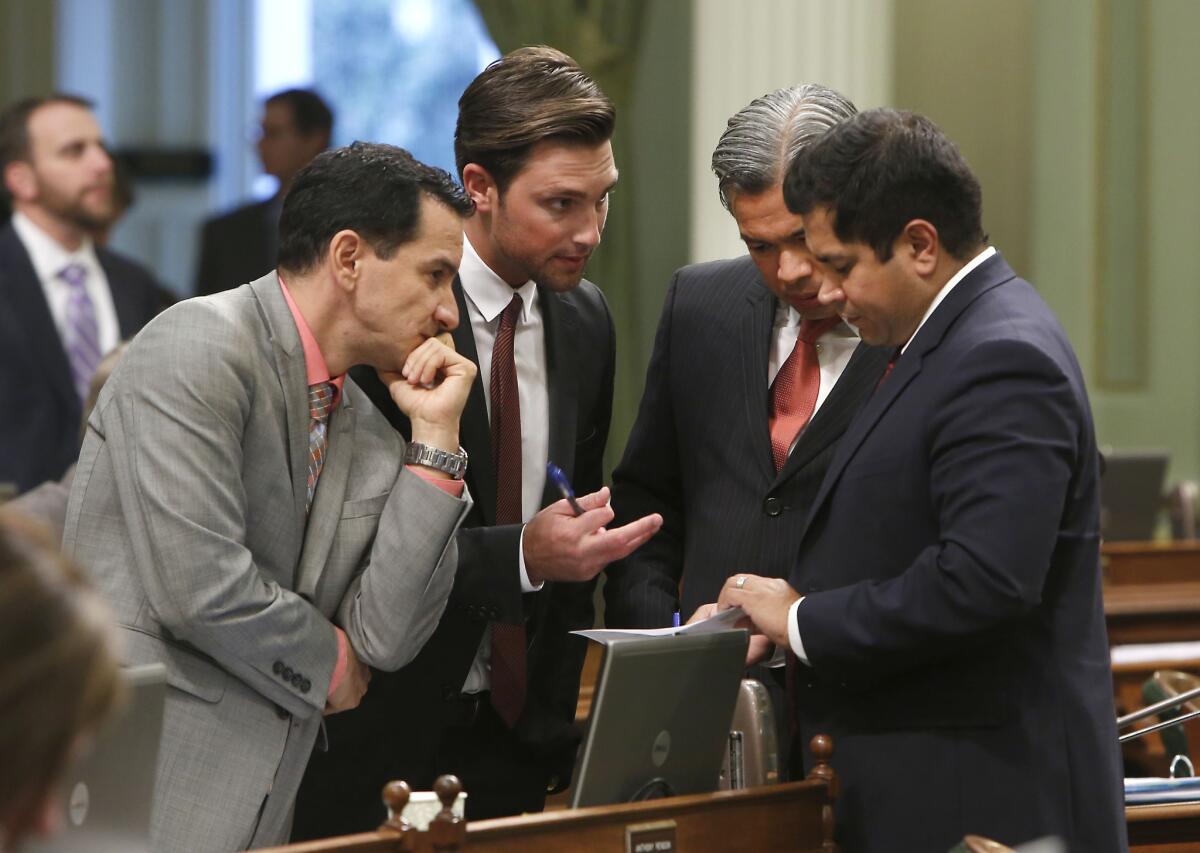California lawmakers face major policy bills in this last week

Democratic Assembly members, from left, Anthony Rendon of Lakewood, Ian Calderon, of Whittier, Rob Bonta of Alameda and Jimmy Gomez of Los Angeles, huddle during an Assembly session at the Capitol.
State lawmakers return to work Tuesday with more than 300 bills awaiting their action in the final four days of this year’s regular session.
The governor has called concurrent special sessions on healthcare and transportation that could go beyond Friday. But legislative leaders have said they want to wrap up action this week.
Outstanding issues include regulation of medical marijuana and electronic cigarettes, slashing gas use in the state and allowing physicians to prescribe life-ending drugs to terminally ill Californians.
The aid-in-dying bill is expected to come up for an Assembly floor vote as early as Tuesday, but after that it would still have to go through the Senate committee process and a floor vote in that house if it is to be sent to the governor.
Also awaiting action is a package of six bills to regulate tobacco, including one that would increase the smoking age to 21. Another would ban electronic cigarettes in public places, such as restaurants, where smoking is currently prohibited.
The outcome is unclear; there is pressure to put off some of those bills until next year.
At the same time, a proposal to raise the tobacco tax by $2 per pack is being considered as one way to expand healthcare for the poor.
Some of the toughest challenges facing lawmakers this week involve legislation to fight climate change -- proposals sought by state Senate leader Kevin de Leon (D-Los Angles) and Gov. Jerry Brown. The most controversial of those would require California to cut in half within 15 years the use of gasoline on its roads.
The measure has passed the Senate, but oil companies are fiercely opposed, and some Assembly members are balking, questioning whether state regulators should be empowered to draw up new rules for meeting the target.
Also up this week is a proposal to automatically register to vote all eligible citizens who obtain a California driver’s license, unless they opt out.
Law enforcement agencies in California would have to report the number of people they stop, the outcome of the stop and the perceived ethnicity of those arrested under legislation still on the table this week.
Assemblywoman Shirley Weber (D-San Diego) introduced the bill in response to several incidents throughout the country in which officers stopped, and in some cases shot, African-American men.
On the issue of marijuana, Brown has been working with lawmakers in hopes of coming up with a plan for statewide regulation of medical cannabis. It was legalized by voters in 1996.
Assemblyman Ken Cooley (D-Rancho Cordova) said the governor wants a new office set up for the purpose, with other agencies becoming involved in enforcement for specific aspects of the industry.
The proposed bill would allow dual licensing by cities and the state, permitting municipalities to revoke dispensary licenses.
“The governor’s staff has devoted considerable time and resources to this,” Cooley said. “Most of the stakeholders feel the broad pallet of ideas are ones they can live with.”
An early version of the governor’s proposal did not have an exemption for the city of Los Angeles, where voters have approved their own medical marijuana standards.
Officials there want the local laws to take precedence over any state rules, according to Aaron Lachant, an attorney who represents dozens of dispensaries.
Chris Megerian contributed to this report.
More to Read
Sign up for Essential California
The most important California stories and recommendations in your inbox every morning.
You may occasionally receive promotional content from the Los Angeles Times.











